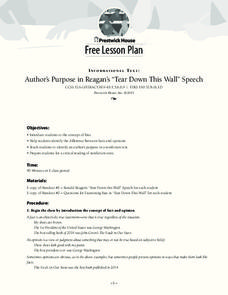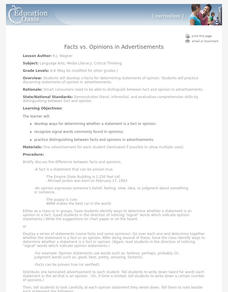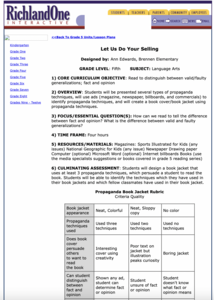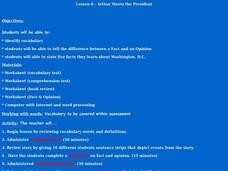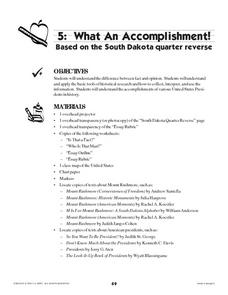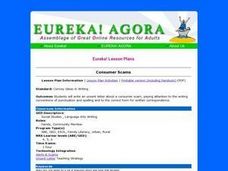Curated OER
CHRISTMAS FILM REVIEW
High schoolers write reviews of films they have seen over the Christmas holidays. They study what the ingredients of a film review are, and examine the difference between fact and opinion.
Curated OER
Fact
Young scholars read about polar bears and discuss and identify the facts they learn about them. In this facts lesson plan, students explain why their facts are not opinions.
Curated OER
Is That a Fact?
Middle schoolers write examples of facts and opinions on the board. In groups, they develop their own definitions for facts and opinions and share with the class. In new groups, they complete a worksheet in which they place statements...
Prestwick House
Author’s Purpose in Reagan’s “Tear Down This Wall” Speech
President Ronald Reagan's "Tear Down This Wall" speech, delivered on June 12, 1987 before the Berlin Wall, provides class members with an opportunity to examine three key aspects of informational text: author bias, the use of facts and...
Curated OER
Facts vs. Opinions in Ads
Students develop criteria for determining statements of opinion. They practice discerning statements of opinions in advertisements.
Curated OER
Fighting Fake News
Fake news. Alternative facts. Internet trolls. In an age of Newspeak, it's increasingly important to equip 21st century learners with the skills needed to determine the legitimacy of claims put forth on social media, in print, and in...
Curated OER
Identifying Facts and Forming Opinions
Kirsten Hall's animal books provide learners with an opportunity to practice forming statements of opinions and factual statements. Using sentence starters such as "I learned. . ." and "I think. . ." class members craft sentences cite a...
Curated OER
Understanding and Using Primary and Secondary Sources in History
Explore primary and secondary sources in this historical analysis lesson. Young researchers define the terms primary source and secondary source. They read a primary source document provided by the teacher and answer questions about...
Curated OER
Bias
High schoolers apply techniques of distinguishing between fact and opinion. Students identify words associated with persuasion and argument. High schoolers read and categorizer a variety of newspapers and articles. Students identfy bias...
Curated OER
Let Us Do Your Selling
Sixth graders analyze several types of propaganda techniques and create a book cover using the techniques. In this propaganda techniques lesson, 6th graders analyze the propaganda techniques used in various ads. Students analyze the...
Curated OER
Nutty About Peanut Butter
Students brainstorm list of lunchtime sandwiches, identify difference between fact and opinion, research facts about peanut butter online, complete Nutty About Peanut Butter worksheet, and create their own fact and opinion worksheets...
Curated OER
Arthur Meets the President
Learners read, Arthur Meets the President, and review the story using sentence strips and complete a book review activity with a partner. In this reading skills instructional activity, students work on fact...
Curated OER
What an Accomplishment
Students identify and discuss the images on the back of the South Dakota quarter. They discuss the differences between facts and opinions, and research information about the four presidents memorialized on Mount Rushmore.
Curated OER
Author's Opinion
Fifth graders read a text about Amelia Earhart's father and use facts from the text to identify the author's opinion. In this author's opinion lesson plan, 5th graders complete a worksheet that is provided.
Curated OER
Scapegoating and Othering
Scapegoating and "Othering" is the focus of a series of activities that ask groups to consider how these behaviors contribute to hatred and intolerance. Groups are given a scenario and discussion questions based on the situation. Whether...
EngageNY
Identifying Author’s Opinion and Evidence: The Value of Sports in People’s Lives, Part I
Just like instant replay, it's time to take a closer look! Pupils work together to add ideas to a Close Readers Do These Things anchor chart. They then put their knowledge to the test as they read an informational article about the...
Curated OER
Turning Literature into News
Learners examine the newspaper. In this writing purposes lesson, students read the newspaper and discuss the purpose: to inform, entertain and persuade. Learners identify facts and opinions. Students write an article and discuss acts of...
Curated OER
Convey Ideas in Writing
Use the platforms of the 2004 presidential candidates to bring persuasive writing to your class. Young voters identify the three issues most important to them in the election and research the issues and candidates' positions. They write...
Roy Rosenzweig Center for History and New Media
Analyzing Political Campaign Commercials
Imagine a lesson that models for learners how to separate facts from opinions. How to detect bias. How to evaluate a source of information. How to identify propaganda. Although designed for middle schoolers, the activities in this packet...
Curated OER
Thinking Out Loud
Students share opinions about whether a series of statements from the internet constitute facts or opinions. They read and analyze blogs published in on the web in order to understand the use of fact, opinion, and tone of voice when...
Curated OER
Identifying Opinions with Signal Words
First graders identify opinions within a text. In this language arts lesson, 1st graders discuss the definition of opinion. Students identify words that signal opinions and work together to identify opinions within the text.
Pennsylvania Department of Education
Analyzing Key Ideas and Details in Nonfiction
Students explore nonfiction texts. In this language arts lesson, students read a nonfiction text and make predictions. Students identify facts and opinions in the text and draw conclusions as they read.
Curated OER
Persuasive Writing
Use a quick bell-ringer to interest your class in the art of persuasion. They brainstorm where they find examples of persuasion in their lives and identify who is trying to persuade them. Then they either fish through magazines or look...
Curated OER
The Vikings
Students research and explore Viking culture, distinguishing between fact and fiction, and examine their contribution to our society.


